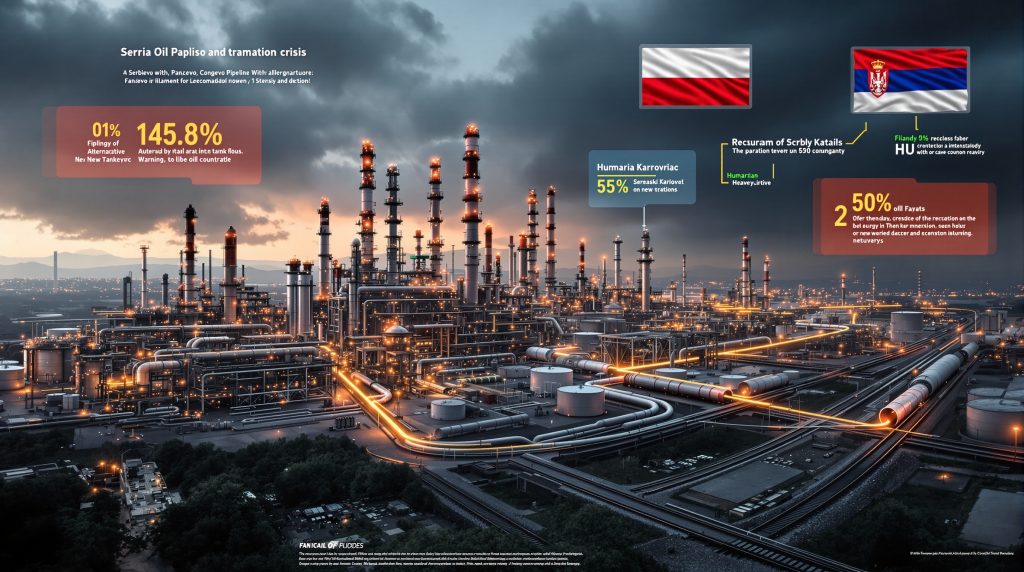Understanding Serbia's Energy Supply Crisis
Serbia confronts a severe energy security challenge as international sanctions halt oil flows to Serbia, effectively severing its primary crude oil procurement channels. The disruption threatens the operational continuity of the nation's single refining facility, creating cascading effects throughout multiple economic sectors during a critical period of heightened winter energy demand.
The sanctions framework operates through multilayered financial and logistical restrictions that became fully effective when the U.S. Treasury's Office of Foreign Assets Control allowed existing exemptions to expire in October 2025. This regulatory shift immediately blocked crude oil purchases by Russian-controlled entities operating within Serbian territory, creating an acute supply gap that existing strategic reserves cannot sustain indefinitely.
Timeline of Supply Chain Disruption
The crisis unfolded through a series of interconnected events that systematically dismantled Serbia's established energy supply infrastructure. Furthermore, these developments highlight the complex nature of modern energy security challenges.
| Date | Event | Immediate Impact |
|---|---|---|
| October 9, 2025 | OFAC sanctions waiver expires | Complete halt to Russian crude purchases |
| Mid-October 2025 | Croatian JANAF pipeline cessation | Primary transit route blocked |
| Late October 2025 | Strategic inventory drawdown accelerates | Domestic fuel price volatility increases |
| November 2025 (projected) | Refinery shutdown risk materializes | Processing capacity threatened |
Critical Role of Pančevo Refinery Infrastructure
The Pančevo refinery complex represents Serbia's energy processing cornerstone, with an annual throughput capacity of approximately 4.8 million tonnes of crude oil. This singular industrial installation supplies over 80 percent of domestic gasoline and diesel requirements, making its uninterrupted operation fundamental to national energy security and economic stability.
Key Facility Specifications:
• Annual crude processing capacity: 4.8 million tonnes
• Domestic fuel market share: 80%+ for refined petroleum products
• Employment impact: Several thousand direct positions and extensive indirect job creation
• Regional significance: Primary fuel supplier to neighbouring Balkan markets
• Strategic importance: Only major refining facility within Serbian borders
The installation's strategic value extends beyond domestic consumption patterns, functioning as a regional energy distribution hub that supports neighbouring countries' refined product requirements through established cross-border supply networks and pipeline infrastructure. Moreover, US sanctions on Serbian energy companies have intensified these operational challenges.
Alternative Supply Route Development
Serbia's government has initiated comprehensive contingency planning to replace disrupted crude oil supplies through multiple strategic approaches. These alternatives require significant infrastructure modifications, diplomatic coordination, and financial restructuring to achieve operational viability.
Hungarian Pipeline Integration
Serbian officials are negotiating enhanced access through Hungarian energy infrastructure, potentially routing crude supplies through the existing Druzhba pipeline system. This strategic option requires extensive diplomatic coordination with both Hungarian authorities and upstream suppliers to accommodate increased throughput volumes whilst maintaining compliance with international sanctions frameworks.
Railway Terminal Expansion Project
The newly constructed Sremski Karlovci railway terminal represents a fundamental strategic pivot toward rail-based crude oil transportation capabilities. This facility infrastructure can accommodate substantially larger cargo volumes compared to previous installations and provides operational flexibility for sourcing crude supplies from geographically diverse supplier networks across multiple regions.
Regional Energy Swap Arrangements
Bilateral cooperation agreements with neighbouring European countries offer immediate short-term relief through refined petroleum product exchanges. These arrangements enable Serbia to maintain critical fuel supplies during the transition period whilst developing comprehensive longer-term crude oil sourcing solutions and supply chain diversification strategies.
Economic Consequences Across Energy Sectors
The supply disruption generates significant economic consequences throughout Serbia's integrated energy value chain. Increased import costs for refined petroleum products, substantial fuel price volatility, and widespread investment uncertainty in energy infrastructure development projects represent the most immediate challenges facing policymakers and industry stakeholders. Additionally, oil price movements analysis reveals broader market implications beyond Serbia's borders.
Cost Structure Analysis:
| Impact Category | Short-term Effects | Projected Long-term Outcomes |
|---|---|---|
| Refined fuel import costs | 15-25% price increase | Market stabilisation through diversification |
| Price volatility levels | High uncertainty periods | Gradual normalisation process |
| Infrastructure investment | Project delays and postponements | Accelerated alternative development |
| Employment stability | Temporary sector disruptions | Potential structural reorganisation |
Strategic Supply Continuity Measures
Government officials indicate that current strategic petroleum reserves should sustain domestic consumption requirements through the end of 2025, providing a crucial buffer period for implementing comprehensive alternative supply arrangements and infrastructure modifications.
Multi-Track Continuity Strategy:
Strategic Reserve Management
Existing petroleum inventory stockpiles provide temporary supply security, allowing sufficient time for alternative procurement arrangements to become fully operational. This approach requires sophisticated demand forecasting capabilities and efficient distribution network management to maximise available resources.
Import Source Diversification
Expanding refined product imports from multiple international suppliers reduces systemic dependence on single supply chain networks. This diversification strategy enhances overall supply security but involves higher transportation costs and increased logistical complexity across procurement operations.
Demand Management Implementation
Government authorities are implementing comprehensive efficiency measures and potentially introducing rationing mechanisms during peak consumption periods to extend available fuel supplies whilst alternative sourcing arrangements become fully operational.
Regional Energy Infrastructure Impacts
The sanctions halt oil flows to Serbia and the impact extends significantly beyond Serbian territorial boundaries, affecting regional energy cooperation frameworks and infrastructure utilisation patterns throughout the Balkans. Croatia's JANAF pipeline system experiences substantial revenue losses from reduced throughput volumes, whilst neighbouring countries reassess existing energy cooperation agreements.
Infrastructure Utilisation Changes:
JANAF Pipeline System Operations
• Previous throughput levels included significant Serbian crude oil volumes
• Revenue impact represents substantial operational losses
• Strict compliance requirements with international sanctions regimes
• Potential long-term restructuring of transit agreements
Regional Distribution Network Reconfiguration
The supply disruption forces comprehensive reconfiguration of established distribution patterns, potentially increasing transportation costs and extending delivery timeframes across interconnected Balkan energy markets. In addition, trade war market impacts demonstrate similar disruption patterns across global energy systems.
Geopolitical Implications and Strategic Positioning
The energy crisis illuminates broader geopolitical tensions between maintaining traditional energy partnerships and achieving compliance with international sanctions regimes. Serbia's response demonstrates the complex diplomatic balancing required when energy security considerations intersect with evolving geopolitical alignment pressures.
Strategic Challenge Navigation:
Serbian policymakers face mounting pressure to align with Western sanctions frameworks whilst simultaneously maintaining energy security through all available supply sources. This challenging situation requires exceptional diplomatic flexibility and pragmatic policy approaches that prioritise citizen welfare and economic stability above ideological considerations.
Long-term Energy Strategy Transformation
The supply disruption significantly accelerates Serbia's energy diversification initiatives, potentially catalysing substantial investments in renewable energy infrastructure development and establishing alternative supply partnerships with non-sanctioned international suppliers. Consequently, energy transition insights become increasingly relevant for understanding Serbia's strategic pivot.
What Are the Future Energy Portfolio Considerations?
Renewable Energy Development Acceleration
• Increased governmental focus on domestic clean energy generation capacity
• Accelerated solar and wind power project implementation
• Enhanced energy independence through indigenous renewable resources
• Reduced vulnerability to geopolitical supply disruptions
Supply Source Geographic Diversification
• Multiple crude oil and refined product supplier relationships
• Geographic risk distribution across stable supplier countries
• Long-term procurement agreements with reliable international partners
• Strategic partnerships with European Union-aligned energy suppliers
Infrastructure Resilience Enhancement
• Enhanced strategic storage capabilities for emergency situations
• Improved distribution network flexibility and redundancy
• Cross-border interconnection infrastructure development
• Advanced demand management and efficiency systems
Energy Security Planning Lessons
The Serbian experience demonstrates fundamental vulnerabilities inherent in energy systems dependent on single supply sources or geopolitically sensitive partnership arrangements. Effective national energy security requires diversified supply chains, adequate strategic reserve capacities, and flexible infrastructure systems capable of rapid adaptation to changing geopolitical conditions.
Critical Planning Insights:
• Supply diversification reduces systemic vulnerability to external disruption events
• Strategic reserve maintenance provides essential buffer periods during crisis transitions
• Infrastructure flexibility enables rapid operational adaptation to evolving supply conditions
• Diplomatic relationship management directly affects national energy access capabilities
• Comprehensive crisis preparedness requires detailed contingency planning across all scenarios
The resolution methodology for Serbia's energy supply crisis will likely establish important precedents influencing regional energy cooperation frameworks and national energy security strategies throughout the broader Balkans region. Furthermore, the waiver expiration marked a critical turning point that created lasting implications for managing similar supply disruptions within interconnected European energy systems.
However, as sanctions halt oil flows to Serbia, the situation continues to evolve rapidly, requiring constant adaptation and strategic flexibility from all stakeholders involved in regional energy security planning.
Disclaimer: This analysis contains forward-looking assessments based on current geopolitical conditions and energy market dynamics. Actual outcomes may vary significantly based on evolving international sanctions policies, diplomatic negotiations, and energy market developments. Readers should consult current government sources and energy industry publications for the most recent developments regarding Serbia's energy supply situation.
Could Serbia's Energy Crisis Signal Broader Investment Opportunities?
Discovery Alert's proprietary Discovery IQ model tracks critical minerals and energy sector developments across global markets, providing investors with real-time insights into opportunities that emerge from supply chain disruptions like Serbia's current energy crisis. Experience how major geopolitical shifts can create actionable investment opportunities by beginning your 30-day free trial with Discovery Alert today and position yourself ahead of rapidly evolving energy markets.




